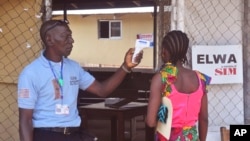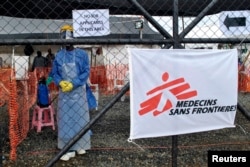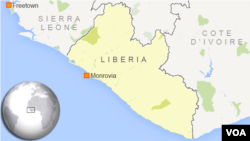Sebastian Dean sits in front of his house in Liberia’s Cow Field Community, in Paynesville, on the outskirts of Monrovia, watching his children play soccer with other neighborhood children.
Dean, 38, a nurse, and his family were among the more than 150 people who had been quarantined for 21 days after having come into contact with a 15-year-old boy, Nathan Gboto, who died from Ebola last month.
All those quarantined were found free of Ebola and were released from the quarantine center on December 11.
They have been reintegrated into their community.
Fears of stigma
Despite initial fears of stigma, Dean said he and his family was welcomed back into the community -- a stark change from last year when fear, lack of education and community resistance left survivors and victim contacts ostracized.
“My friends, brothers, whosoever, everybody [is] coming around. It was necessary and they highly welcomed us," he said. "Community people actually, the community. I even thank the community chairman, the community people, every one of them. I mean, they work in line with us and, today, we are all living happily, no stigmatization.”
More than 10,000 people have contracted Ebola since the outbreak began in 2014 and more than 4,000 died.
For a long time, many survivors and the families of victims were shunned and ostracized, due to fear of the virus.
But now, things have begun to change, they say.
Awareness
Cow Field Community Chairman Thomas Pluato said upon hearing that his community was affected, he and his neighbors worked to create awareness on stigmatization.
"We were very happy to have received them from the ETU (Ebola Treatment Unit). ... I performed the welcoming ceremony by becoming the first person to shake all of [their] hands," Plauto said.
"Normally, when you are pronounced [an] Ebola survivor or patient, it stigmatizes you. But since we are getting to understand what Ebola is and how it works and what are the preventive measures, so we thought it wise that we can not get the Ebola from them when they have already been pronounced survivors," he said.
Dr. Mosoka Fallah of Liberia’s Ministry of Health said he has been working with the community to show them that stigma is not helpful.
“We have learned a lot about the dark episode of the Ebola crisis. There has been some good things we can look back to. The community perception has changed a lot and it is in our favor," Fallah said. "To work with that, and the experiences we learn from Ebola can be used to attack other essential health issues in our country. The communities are resourceful. We need to take advantage of that to address health issues and other things.”
Liberia is again waiting for a 42-day incubation period to end in order to be declared Ebola-free... for the third time.






